Reading Time: 5minutes
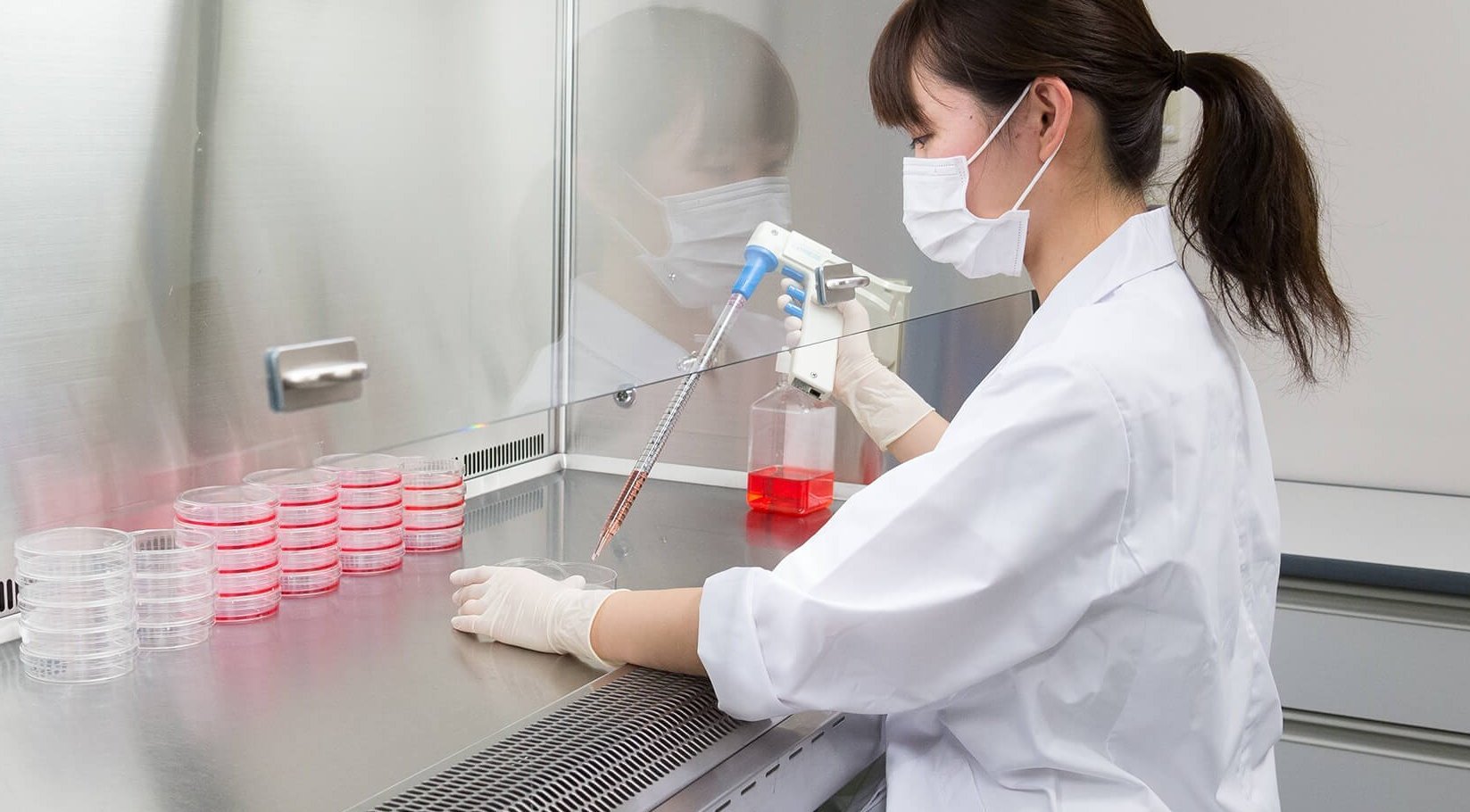
Table of Contents
Regenerative medicine is reshaping the landscape of modern healthcare, offering the potential of revolutionary drug and cell-based therapies for Parkinson’s disease, heart failure, macular degeneration, spinal cord injury, and even cancer. Through its expertise in “AminoScience*”, the Ajinomoto Group wants to play a pivotal role in this transformative field.
*A collective term for the various materials, functions, technologies, and services derived from research and implementation processes with a rigorous focus on unlocking the power of amino acids. It also refers to the Ajinomoto Group’s unique scientific approach to connect these to resolving social issues and contributing to well-being.
Stem cells: the future of medicine
Humans begin life as a single cell, which divides and multiplies until there are more than a trillion of them in the body. As cells grow, they differentiate, eventually forming the various cell types of the body. These early stage “stem cells” are said to be “pluripotent” because they have the potential to become any type of cell. Regenerative medicine focuses on using stem cells to regenerate damaged or lost tissues and functions due to injury or disease.
iPS cells: a game-changer
Among the various avenues of regenerative medicine, one that stands out is the use of induced pluripotent stem cells (iPS cells) and embryonic stem cells (ES cells). This innovative approach involves the artificial creation of functional cells and tissues for transplantation or immunotherapy.
In 2012, Professor Shinya Yamanaka of Kyoto University’s iPS Cell Research Institute was awarded the Nobel Prize in Physiology or Medicine for his discovery that mature cells could be reprogrammed into iPS cells, opening new horizons in regenerative medicine.
Regenerative medicine using iPS cells involves taking skin and blood samples from an individual and reprogramming these cells into iPS cells. It promises curative treatment for conditions such as heart disease by generating specific tissues and organs for transplantation, without the need for an organ donor or immunosuppressants.

Regenerative medicine using iPS cells is also a catalyst for drug discovery and development, allowing researchers to create both healthy and abnormal tissues and organs for the purpose of testing drug reactions and modeling diseases, resulting in more effective therapies free from side effects.

Given all this, it’s not an overstatement to say that iPS cells hold the potential to revolutionize healthcare as we know it.
StemFit™: the Ajinomoto Group's Contribution to Regenerative Medicine
The Ajinomoto Group’s involvement in regenerative medicine began with collaborative research alongside Kyoto University’s iPS Cell Research Institute, focusing on a critical element: the culture medium.
A culture medium is the environment in which microorganisms and biological tissues are proliferated, or grown. For stem cells, the culture medium is a nutrient solution containing a mix of amino acids, carbohydrates, lipids, vitamins, minerals, growth factors, and other substances, the proportions of which vary depending on the desired target cells.
Vital for the reprogramming, proliferation, and differentiation of iPS cells, the culture medium is a linchpin in regenerative medicine.
In 2014, the partnership between Ajinomoto Co., Inc and the iPS Cell Research Institute led to the development of StemFit™, a high-performance, high-quality culture medium that allows iPS and ES cells to proliferate at rapid rates, minimizing the risk of biological contamination and enhancing safety.StemFit™ has streamlined large-scale production of high-quality iPS cells, a key factor in advancing regenerative treatments.

Why Ajinomoto?
How did a food company like the Ajinomoto Group become involved in regenerative medicine? The answer lies in its core strengths in amino acid production and the nutritional research underpinning StemFit™.
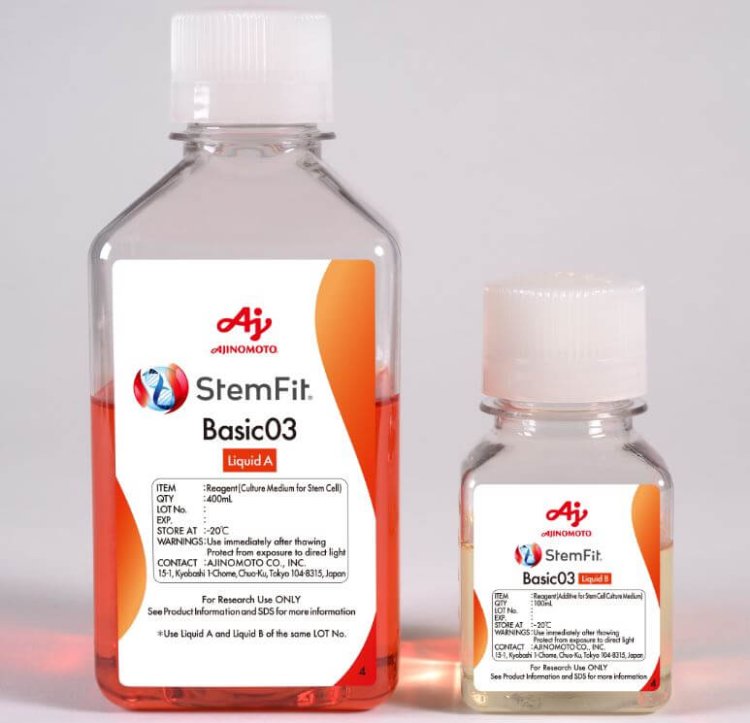
StemFit™ products marketed by Ajinomoto Co. Inc.
The Group’s technology for producing high-quality amino acids and extensive track record of research and development in the food and nutrition field are key to making the amino acids necessary for the culture medium and ensuring optimal cell growth.
According to Hiroshi Itaya, PhD, Associate General Manager at Ajinomoto Co.’s Bio-Pharma Solutions Group: “There are only a few companies in the world that can provide high-quality amino acids suitable for medical purposes.” The Ajinomoto Group’s long-standing nutritional research has optimized the ingredients of StemFit™ as a medium for the growth of cells using its knowledge of amino acids and other substances required by the human body, such as minerals, carbohydrates, and vitamins.
The Ajinomoto Group’s history in medical amino acid production dates to 1956. It was a pioneer in introducing animal-free, serum-free culture media for biopharmaceuticals in 1987. In 2012, the Group established a culture media manufacturing plant in South Korea. These foundations culminated in the creation of StemFit™ in 2014 and its release in 2016.
StemFit™ has continued to evolve and expand its lineup to meet various needs, and now boasts the largest share of the iPS cell culture media market in Japan.
Benefits of StemFit™
StemFit™ offers a groundbreaking approach to iPS cell culture. Traditionally, culturing iPS cells was complicated and required precise clumping and the use of feeder cells, often derived from mice. But this method carried the risk of adverse immune reactions. StemFit™ eliminated these complexities, enabling efficient iPS cell culture without the need for feeder cells.
“In the field of regenerative medicine, where safety assurance is crucial,” explains Itaya, “it’s important to eliminate the possibility of immune reactions caused by feeder cells derived from non-human animals.” He adds that StemFit™ has not only simplified cell culture but has also led to the accumulation of invaluable data, enhancing the reliability of the culture process.
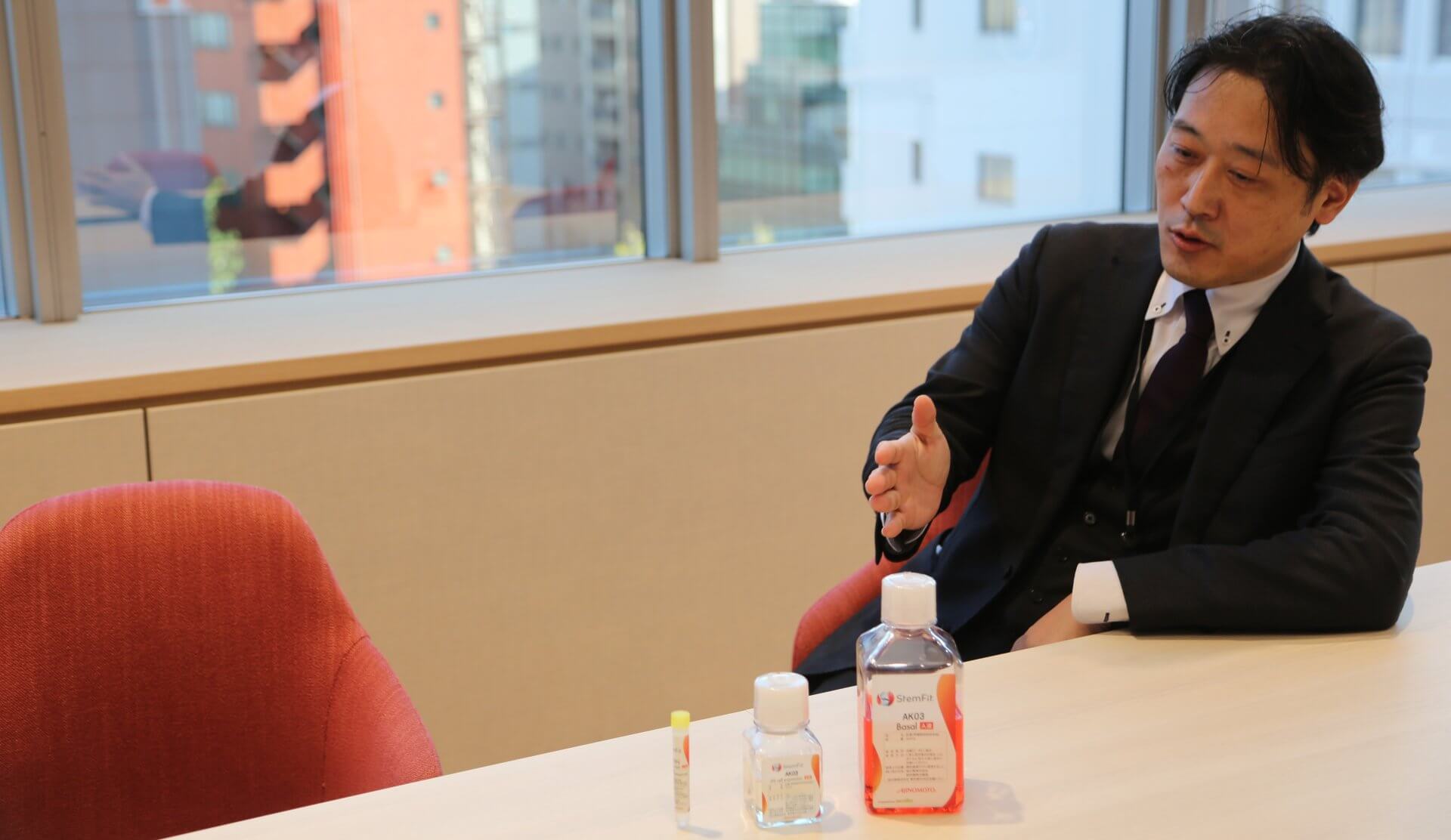
Itaya describing the product lineup
Expanding StemFit™’s Horizons Globally
Shuhei Wakimoto, Associate General Managerfor Ajinomoto Co.’s Bio-Pharma Solutions Group, is dedicated to expanding StemFit™’s global presence, especially to North America, where it is poised to meet the rising demand for immunotherapy, with the commercialization of iPS cell-based therapies on the horizon.
“StemFit™ provides the best nutrients for the target cells,” explains Wakimoto. “For example, in collaboration with Heartseed, a venture company that originated at Keio University, we’ve contributed to the purity of cardiac muscle cells for use in therapies by finding ingredients that are nutritive for such cells but not for iPS cells. In the process of transforming iPS cells into cardiac muscle cells, it is not desirable for iPS cells to remain in the medium, so they are removed. This technology and development system is unique to the Ajinomoto Group.”
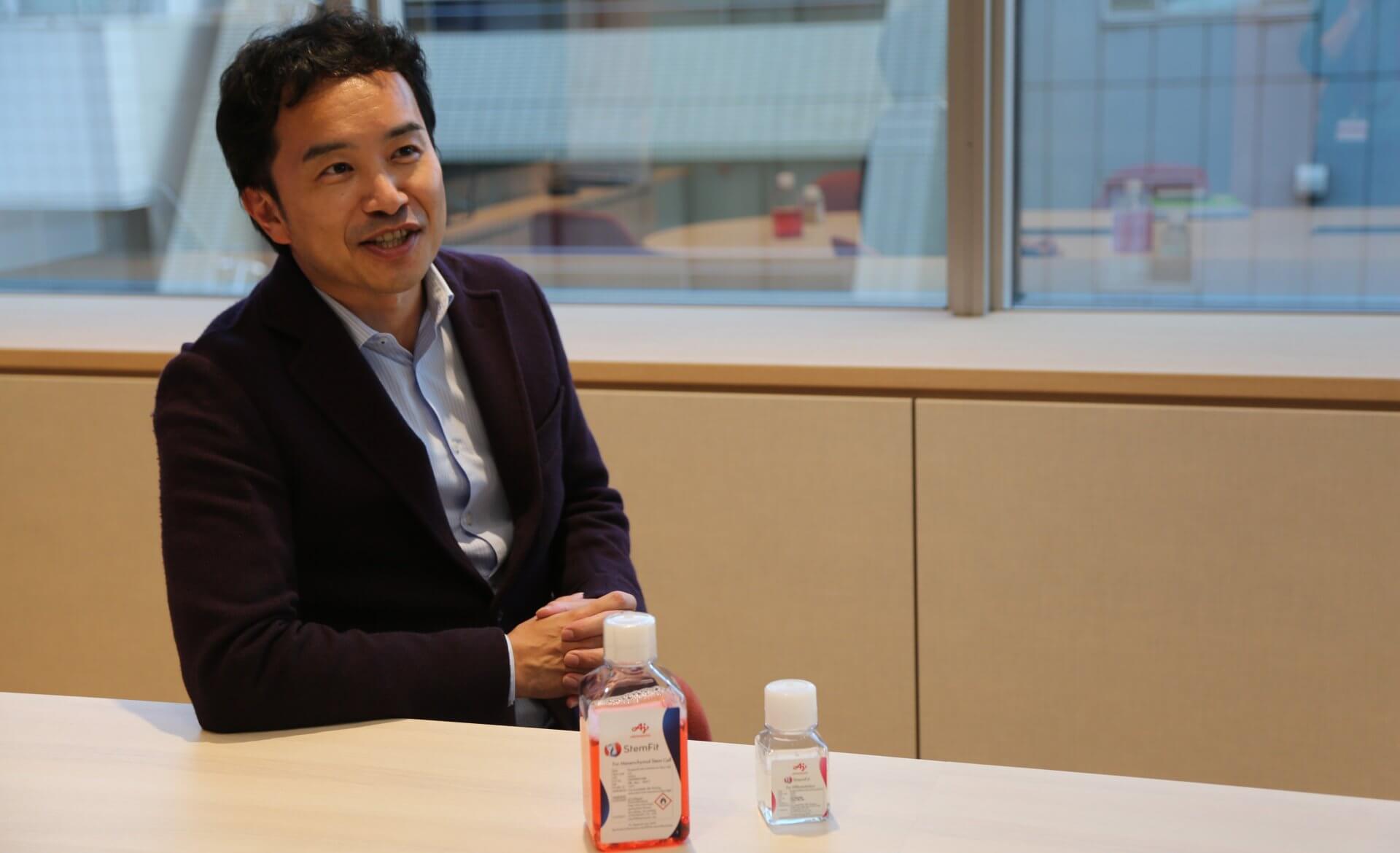
Wakimoto discussing the unique features of Ajinomoto’s technology and development system
Collaborations with culture media users, including cell manufacturing service providers and equipment manufacturers, aim to share insights for high-quality cell production, expediting global advances in regenerative medicine.
“The method of creating target cells from iPS cells differs from one pharmaceutical company to another and from one therapeutic method to another. In close collaboration not only with pharmaceutical companies and medical institutions but also industry partners, we want to help create a platform to make reliable starting materials, iPS cells for cell-based therapies,” says Wakimoto.
The Ajinomoto Group's Vision
The Ajinomoto Group aims to extend the healthy life expectancy of one billion people by 2030. Regenerative medicine, with StemFit™ at its core, plays a pivotal role in realizing this vision. The Group’s collaborations with pharmaceutical and venture companies deeply involved in regenerative medicine underscore this commitment.
While regenerative medicine may not yet benefit all patients, collective efforts hold the promise of extending and enhancing lives. Recent achievements, such as retina transplants from iPS cells and innovative approaches to conditions like cancer and Parkinson’s disease, highlight the tangible impact of this developing technology.
StemFit™ stands at the forefront, simplifying iPS cell culture and driving drug development. The Ajinomoto Group’s commitment to quality culture media helps ensure the continued growth of regenerative medicine, promising to help transform global healthcare in the process.
A short video about the Ajinomoto Group’s StemFit™ initiative and its collaboration with Heartseed
Find out more
Stories you may like
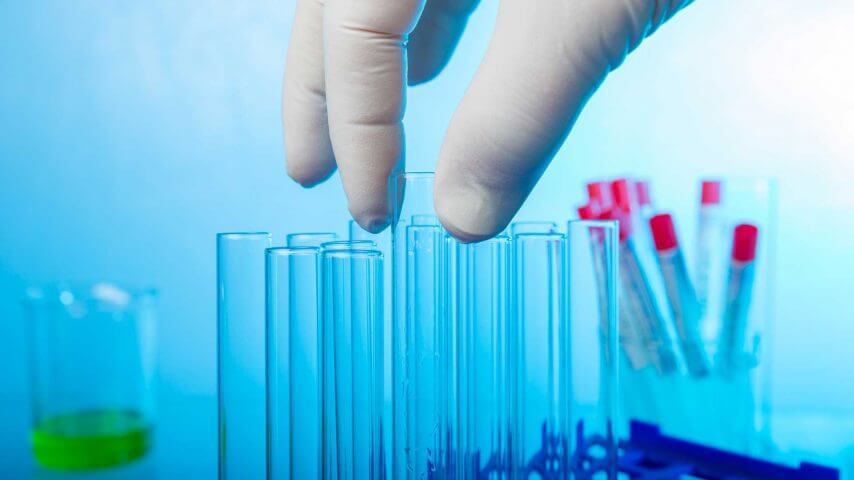
AminoIndex® Risk Screening (AIRS®) and wellness maintenance
- Amino Acids
- Health and Well-being
- ICT&Healthcare
- Innovation
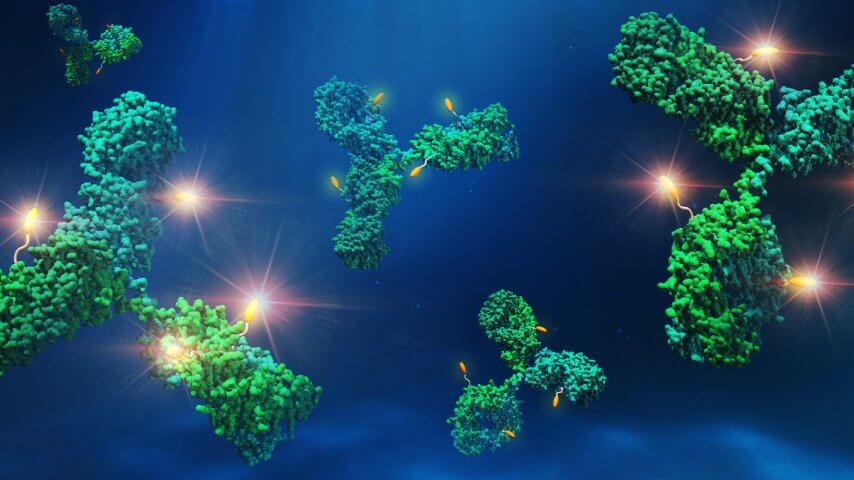
AJICAP®—Cutting-edge technology that offers hope to cancer patients
- Amino Acids
- Health and Well-being
- ICT&Healthcare
- Innovation

AMIHOPE®SB—Amino Acid Technology Gives New Hope for Reducing Microplastics
- Amino Acids
- Health and Well-being
- ICT&Healthcare
- Innovation



